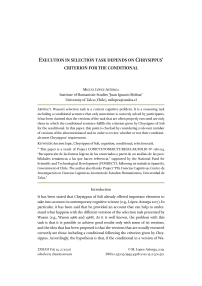Execution in selection task depends on Chrysippus’ criterion for the conditional
Автор: Miguel López-Astorga
Журнал: Schole. Философское антиковедение и классическая традиция @classics-nsu-schole
Статья в выпуске: 2 т.15, 2021 года.
Бесплатный доступ
Wason’s selection task is a current cognitive problem. It is a reasoning task including a conditional sentence that only sometimes is correctly solved by participants. It has been claimed that the versions of the task that are often properly executed are only those in which the conditional sentence fulfills the criterion given by Chrysippus of Soli for the conditional. In this paper, this point is checked by considering a relevant number of versions of the aforementioned task in order to review whether or not their conditionals meet Chrysippus’ requirement.
Ancient logic, Chrysippus of Soli, cognition, conditional, selection task
Короткий адрес: https://sciup.org/147234434
IDR: 147234434 | DOI: 10.25205/1995-4328-2021-15-2-501-512
Список литературы Execution in selection task depends on Chrysippus’ criterion for the conditional
- Barnes, J., Bobzien, S., & Mignucci, M. (2008) “Logic,” in K. Algra, J. Barnes, J. Mansfeld, & M. Schofield, eds. The Cambridge History of Hellenistic Philosophy. Cambridge, UK: 77-225.
- Bocheński, I. M. (1963) Ancient Formal Logic. Amsterdam.
- Cosmides, L. (1989) “The logic of social exchange: Has natural selection shaped how humans reason? Studies with the Wason selection task,” Cognition 31, 187-276.
- Cosmides, L., Barrett, H. C., & Tooby, J. (2010) “Adaptive specializations, social exchange, and the evolution of human intelligence,” Proceedings of the National Academy of Sciences 107, 9007-9014.
- Fiddick, L. & Erlich, N. (2010) “Giving it all away: Altruism and answers to the Wason selection task,” Evolution and Human Behavior 31, 131-140.
- Fiddick, L., Cosmides, L., & Tooby, J. (2000) “No interpretation without representation: The role of domain-specific representations and inferences in the Wason selection task,” Cognition 77, 1-79.
- Gigerenzer, G. & Hug, K. (1992) “Domain-specific reasoning: Social contracts, cheating, and perspective change,” Cognition 43, 127-171.
- Gould, J. B. (1970) The Philosophy of Chrysippus. Albany, NY.
- Khemlani, S. & Johnson-Laird, P. N. (2019) “Why machines don’t (yet) reason like people,” Künstliche Intelligenz 33, 219-228.
- López-Astorga, M. (2017) “Chrysippus’ logic and Wason’s selection task,” in P. Hanna, ed. An Anthology of Philosophical Studies. Volume 11. Athens, Greece: 47-56.
- López-Astorga, M. (2019) “The semantic method of extension and intension and the four criteria of the conditional described by Sextus Empiricus,” Revista de Filosofía 44(2), 253-261.
- O’Toole, R. R. & Jennings, R. E. (2004) “The Megarians and the Stoics,” in D. M. Gabbay & J. Woods, eds. Handbook of the History of Logic, Volume 1. Greek, Indian and Arabic Logic. Amsterdam, The Netherlands: 397-522.
- Ragni, M., Kola, I., & Johnson-Laird, P. N. (2017) “The Wason selection task: A metaanalysis,” in G. Gunzelmann, A. Howes, T. Tenbrink, & E. J. Davelaar, eds. Proceedings of the 32nd Annual Conference of the Cognitive Science Society. Austin, TX: 980-985.
- Sydow, M. von, Hagmayer, Y., Metzner, N., & Waldmann, M. R. (2005) “Cooperation detection and deontic reasoning in the Wason selection task,” in K. Opwis & I.-K. Penner, eds. Proceedings of KogWis05. The German Cognitive Science Conference 2005. Basel, Switzerland: 195-200.
- Wason, P. C. (1966) “Reasoning,” in B. Foss, comp. New Horizons in Psychology. Harmondsworth (Middlesex), UK: 135-151.
- Wason, P. C. (1968) “Reasoning about a rule,” Quarterly Journal of Experimental Psychology 20, 273-281.


